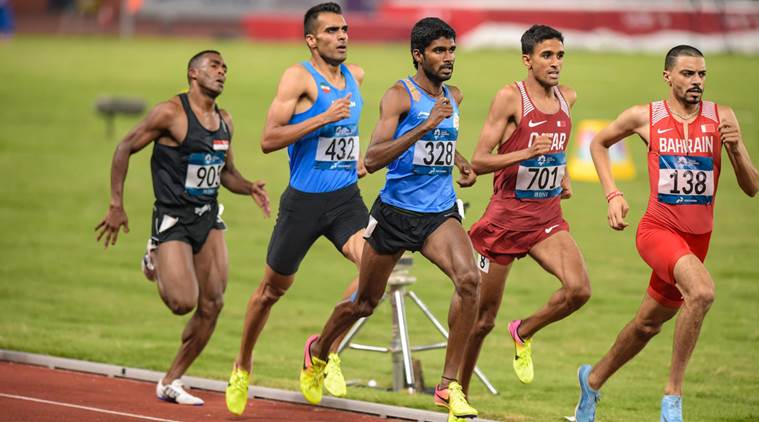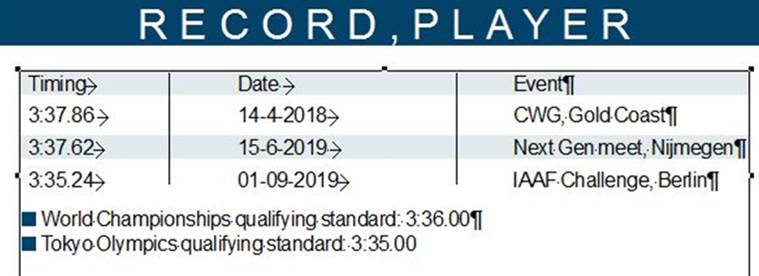
Jinson Johnson is at the Berlin airport, waiting to board a flight to the United States. Colarado Springs will be his training base for the next few months as he strives to qualify for the 2020 Tokyo Olympics. Johnson has reason to celebrate, yet he chooses to remain grounded. In just over two months, he has broken the 1500 metres national record twice, the second time on Sunday at the IAAF World Challenge at the Olympiastadion in the German capital.
He won silver and clocked three minutes and 35.24 seconds to qualify for the World Championships in Doha next month.
Athletes tend to ballyhoo their performances aboard and the medals they win in international competitions when a major event is around the corner. But Johnson starts off by talking about what he missed out on – in terms of electronic timing it was 3:35.00, the qualification standard for the Tokyo Games. He isn’t a glass-is-half-empty pessimist but a realist.

“Over a distance of 1500 metres, microseconds isn’t too much of a time difference. This was also a fast race because there were some good runners, including Olympic medallists. I just missed out on qualifying for the Tokyo Olympics so I am disappointed. My aim was to improve my timing, which I achieved and it gave me a place in the World Championships. The silver medal was a bonus. Yet I have been thinking about how close I was to qualifying for Tokyo,” the 28-year-old said on Monday.

With 150 metres to go, Johnson moved into second place, inching closer to race leader Cornelius Tuwei of Kenya and looked like going past the East African. From the outside lane though, United States’s Joshua Thompson gained ground and nosed ahead of both Johnson and Tuwei, who eventually slipped to third. There were nine runners who had gone faster than the Indian this season and the 17-man field also included two-time Olympic medallist Nick Willis. Johnson says there are two ways to approach a strategic race like the 1500 metres and it depends on what athletes are aiming for — a specific timing or a medal.
Johnson’s 3:35.24 would have given him a sixth place finish at the 2017 World Championships and a gold at the Rio Olympics! United States’ Matt Centrowitz had won gold (3:50.00), however, it was the slowest timing by an Olympic winner over the metric mile in over 80 years.
“It would be an opportunity for a medal, if there is another Olympic final which is so slow. But it is unlikely that will happen again. At the World Championships and the Olympic Games, runners try to outwit each other when it comes to race strategy. So at the major events, the timing is not important as the aim is to win a medal. At the 2016 Olympics, it was race strategy which was key. In events like the IAAF World Challenge, it is about timings more than medals, because people are looking to qualify,” Johnson says elaborating on the relatively faster race.

The season has been a see-saw one for Johnson because a calf injury robbed him of potential medals in the 800m and the 1500m at the Asian Athletics Championships in Doha. Johnson dropped out during the final lap of the 800 metres and did not start the 1500. Looking back, Johnson believes there was a medal for the taking if he was fully fit.
In the longer race Kenyan-born Abraham Kipchirchir Rotich, running for Bahrain, won the gold clocking 3.42.85. Johnson had gone faster in March (3:41.67) to win the title at the Federation Cup in Patiala, which served as the final selection trial for the continental event.
There was a change in fortune, when in June at the Next Generation Athletics meet in Nijmegen, The Netherlands, Johnson won gold and bettered the national record, a performance he says was a confidence-booster.
800 metres dumped
Johnson also took a big decision after the Asian Championships in April — to focus only on the 1500 metres henceforth. “I had discussions with the Athletics Federation of India coaches and we concluded that it is important to train for one event. You can focus on two events and train for them if your objective is to win medals at the Asian level. But if one wants to do well at the Olympics, it is better to train for one event. The training schedule is different for the 800 metres and the 1500, so it gets tougher. I have a better chance of doing well in the 1500 metres at the Olympics,” Johnson said.
He will now spend the next few months at Colorado Springs as part of the training group of the American Distance Project, a centre where army runners are also coached.
“This is the first time I will be training aboard. It will be a new experience and I hope to become a better and smarter runner. The 1500 is a strategic race and results depend on who executes the strategy better on the particular day. So I can’t say how well I will do at the World Championships because it is less than a month away. Maybe if I qualify for Tokyo, I will be in a better position next year to predict where I could finish at the Olympics.”